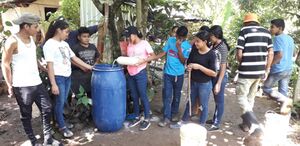Climate change resilient families in Honduras
| Organization | Red COMAL |
|---|---|
| Region | Honduras |
| Website | Website |
| ProjectLeader | Donaldo Zuniga |
This project will strengthen the climate resilience capacities of 50 small farming families in Intibuca, Honduras, working primarily with indigenous youth and women. By converting agricultural waste into organic compost, these small agroecological farms can more efficiently grow crops for subsistence and to generate extra income. We will implement environmentally friendly alternative technologies such as solar greenhouses to dry crops and a facility to produce organic fertilizers and pesticides.
Challenge
One of the biggest problems for small-scale farmers is the lack of resources to purchase agricultural inputs like fertilizers and pesticides, as well as no proper facilities for post-harvest handling. Basic grains must be properly dried and stored to meet market standards, and without adequate facilities there is a risk of crops being ruined, generating economic losses for small farmers who depend on the income for their family's well-being.
Long-Term Impact
Empowering indigenous women and youth through agroecology practices that respect natural processes and optimize resources will protect the longevity and viability of the farmland these rural communities depend on as well as promote self-reliance and leadership. These techniques can achieve comparable crop yields and at the same time save money and protect the environment by using organic inputs instead of toxic chemicals. Avoiding exposure to toxins also increases the health of the community.
References
Project Gallery
